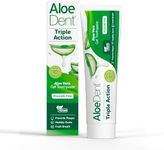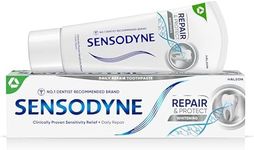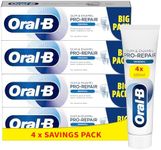Buying Guide for the Best Toothpastes
Choosing the right toothpaste can significantly impact your oral health. With so many options available, it's important to understand the key specifications and how they align with your personal needs. Whether you're looking to whiten your teeth, reduce sensitivity, or fight cavities, knowing what to look for can help you make an informed decision.Fluoride ContentFluoride is a mineral that helps strengthen tooth enamel and prevent cavities. Most toothpastes contain fluoride, but the concentration can vary. For general use, a toothpaste with 1000-1500 ppm (parts per million) of fluoride is recommended. If you have a higher risk of cavities, you might need a toothpaste with a higher fluoride content. Always consult with your dentist if you're unsure about the right fluoride level for you.
Whitening AgentsWhitening toothpastes contain mild abrasives or chemical agents that help remove surface stains from your teeth. If you want to brighten your smile, look for toothpastes with ingredients like hydrogen peroxide or baking soda. However, if you have sensitive teeth, you might want to avoid these as they can sometimes cause discomfort. For those with sensitive teeth, a toothpaste with gentle whitening agents is a better choice.
Sensitivity ProtectionToothpastes designed for sensitive teeth contain ingredients like potassium nitrate or stannous fluoride that help reduce tooth sensitivity. If you experience discomfort when consuming hot, cold, or sweet foods, a sensitivity toothpaste can provide relief. These toothpastes are generally less abrasive and are formulated to protect the nerve endings in your teeth.
Tartar ControlTartar control toothpastes contain ingredients like pyrophosphates and zinc citrate that help prevent the formation of tartar, which is hardened plaque. If you are prone to tartar buildup, using a tartar control toothpaste can help maintain cleaner teeth and gums. However, these toothpastes are not a substitute for regular dental cleanings.
Natural IngredientsNatural toothpastes are made with ingredients derived from plants and minerals, and they often avoid synthetic chemicals, artificial flavors, and colors. If you prefer a more natural approach to oral care, look for toothpastes with ingredients like tea tree oil, aloe vera, and xylitol. These toothpastes can be a good option for those with allergies or sensitivities to certain chemicals.
FlavorToothpaste flavor is a personal preference, but it can also impact your brushing experience. Common flavors include mint, cinnamon, and fruit. If you find a flavor you enjoy, you're more likely to brush regularly and thoroughly. For children, fun flavors can make brushing more appealing and help establish good oral hygiene habits.

















